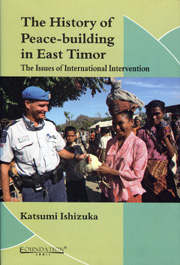Book contents
- Frontmatter
- Contents
- Preface
- Acknowledgements
- Acronyms
- Introduction
- Section 1 Historical Background
- Section 2 Policy Analysis
- Chapter III Review of the United Nations Transitional Administration in East Timor (UNTAET)
- Chapter IV UNMISET and Capacity-building in East Timor
- Chapter V A Judicial Aspect in Peace-building in East Timor: Response to Crimes against Humanity in 1999
- Chapter VI After the 2006 Crisis in East Timor: the Issue of the Exit Strategy and Capacity-building in UN Peace Operations
- Chapter VII Australia's Response to East Timor's Issues
- Section 3 Comparative Analysis
- Conclusion
- Bibliography
- Index
Chapter III - Review of the United Nations Transitional Administration in East Timor (UNTAET)
from Section 2 - Policy Analysis
Published online by Cambridge University Press: 26 October 2011
- Frontmatter
- Contents
- Preface
- Acknowledgements
- Acronyms
- Introduction
- Section 1 Historical Background
- Section 2 Policy Analysis
- Chapter III Review of the United Nations Transitional Administration in East Timor (UNTAET)
- Chapter IV UNMISET and Capacity-building in East Timor
- Chapter V A Judicial Aspect in Peace-building in East Timor: Response to Crimes against Humanity in 1999
- Chapter VI After the 2006 Crisis in East Timor: the Issue of the Exit Strategy and Capacity-building in UN Peace Operations
- Chapter VII Australia's Response to East Timor's Issues
- Section 3 Comparative Analysis
- Conclusion
- Bibliography
- Index
Summary
Introduction
Since the 1990s, several factors such as the compromising of state sovereignty, and the superpowers' interests in humanitarian issues gave rise to the establishment of UN transitional administrations. The United Nations Transitional Administration in East Timor (UNTAET) was one of them. UNTAET was officially launched on 25 October 1999 for a nation-building purpose in East Timor, which had been completely demolished by a campaign of violence by pro-Indonesian militia.
The significance of UNTAET in the history of UN peacekeeping operations can be recognised in the following two points. The first is that while UNTAET was similar to some other relatively successful multi-functional peacekeeping operations such as those in Cambodia (UNTAC) and in Namibia (UNTAG), it was the first operation in which the UN took control of the departments of government in East Timor such as finance, justice, infrastructure, economic and social affairs, etc. Furthermore, in terms of a ‘state-building’ mission, UNTAET was said to be the most exhaustive UN mission. It took on a huge variety of responsibilities, such as responsibility for policing as well as for elections, executive, legislative and judicial sectors, and treaty-making. Indeed, UNTAET was the first UN mission that had treaty-making power. In fact, UNTAET entered into treaties with the World Bank's International Development Association (IDA) and with Australia on the Timor Gap. UNTAET evolved from the experience of the UN operation in Kosovo (UNMIK: 1999-present).
- Type
- Chapter
- Information
- The History of Peace-Building in East TimorThe Issues of International Intervention, pp. 63 - 94Publisher: Foundation BooksPrint publication year: 2010

